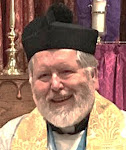Jesus said to them, "my wife".
We now have another frenzy of "Gnostic gospels-Dan Brown is right!-sexist church v. liberated Jesus" stories associated with a late 4th century Coptic text. Thankfully, as Mark Goodacre states, Harvard professor Karen King has approached the matter in an exemplary fashion. Her sober assessment of the significance of the find was summed up by the New York Times:
"She repeatedly cautioned that this fragment should not be taken as proof that Jesus, the historical person, was actually married. The text was probably written centuries after Jesus lived, and all other early, historically reliable Christian literature is silent on the question, she said."
Her final plea was to the point:
"At least, don’t say this proves Dan Brown was right!"
Or, as Ashbury Theological Seminary's Ben Witherington III put it:
"This is no confirmation of the Da Vinci Code or even of the idea that the Gnostics thought Jesus was married in the normal sense of the word."
The affair, however, does allow the Church to reflect on the significance of the fact that Jesus did not marry. He did not marry precisely because He was - is - married. He has a Bride: the ecclesia. The stark contrast between the canonical understanding of the nuptial relationship between the Crucified and Risen One and His Church, and the Gnostic image of the wife of the Jesus, is superbly illustrated in Nicholas Perrin's Thomas, the Other Gospel:
"For Thomas Christians the new creation was not something something objectively realized through Christ, but rather something subjectively realized through the individual's imitation of Jesus ... For orthodox believers, new creation has always been an objective and corporate reality."
As Goodacre notes, this text "definitely evokes the atmosphere of other second and third century Gospels, especially the [Gnostic] Gospels of Thomas, Philip and Mary". As such, it points to how the profound difference in interpreting the nuptial nature of salvation - corporate reality or individual experience - shaped how catholic Christian communities and Gnostic communities received and proclaimed the story of Jesus. For catholic Christian communities, Jesus turns to His Church and says "my wife". For the Gnostic communities, Jesus turns to an individual and says "my wife".
That the Gnostic myths should have such an attraction in the secular age - seventeen centuries after this fragment of the Coptic text was written - is perhaps not surprising. In the words with which Perrin concluded his study of the Gospel of Thomas:
"Perhaps the Great Church rejected the Gospel of Thomas not because it was 'other', but because it was not 'other' enough. In retrospect, the Jesus of Matthew and Simon Peter ... was much more counter-cultural than the one whose words Judas Didymus Thomas claims to preserve."
* * * * *
The same blog had a short but not unrelated post this time last week under the title: Hildegard and the nuptial mystery:
"Hildegard develops at the very heart of her work the theme of the mysterious marriage between God and humanity that is brought about in the Incarnation. On the tree of the Cross take place the nuptials of the Son of God with the Church, his bride, filed with grace and the ability to give new children to God, in the love of the Holy Spirit." From Benedict XVI's "St Hildegard of Bingen" in Great Christian Thinkers: From the Early Church through the Middle Ages.
Hildegard's reflections remind the Church that gender and marriage are not to be considered from the perspective of the social and cultural norms of the 1950s but in light of the Incarnation, Passion and Resurrection of the Word.
"Hildegard develops at the very heart of her work the theme of the mysterious marriage between God and humanity that is brought about in the Incarnation. On the tree of the Cross take place the nuptials of the Son of God with the Church, his bride, filed with grace and the ability to give new children to God, in the love of the Holy Spirit." From Benedict XVI's "St Hildegard of Bingen" in Great Christian Thinkers: From the Early Church through the Middle Ages.
Hildegard's reflections remind the Church that gender and marriage are not to be considered from the perspective of the social and cultural norms of the 1950s but in light of the Incarnation, Passion and Resurrection of the Word.


















1 comments:
Bishop David,
Bear in mind that Dr King is the one who has titled this wee scrap of papyrus without provenance 'The Gospel of Jesus' Wife.' Methinks she is speaking out both sides of her mouth (as my dear old mother used to say!) to the end that she retains academic credibility while at the same time engendering a media frenzy that will be very helpful with the sales of her future popular book on the topic that will inevitably come.
pax et bonum
Post a Comment